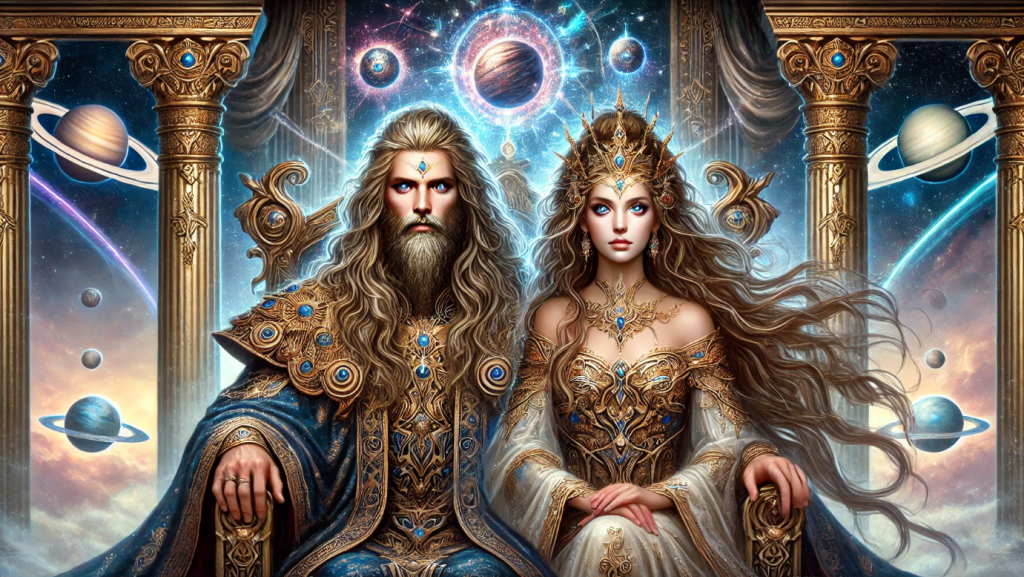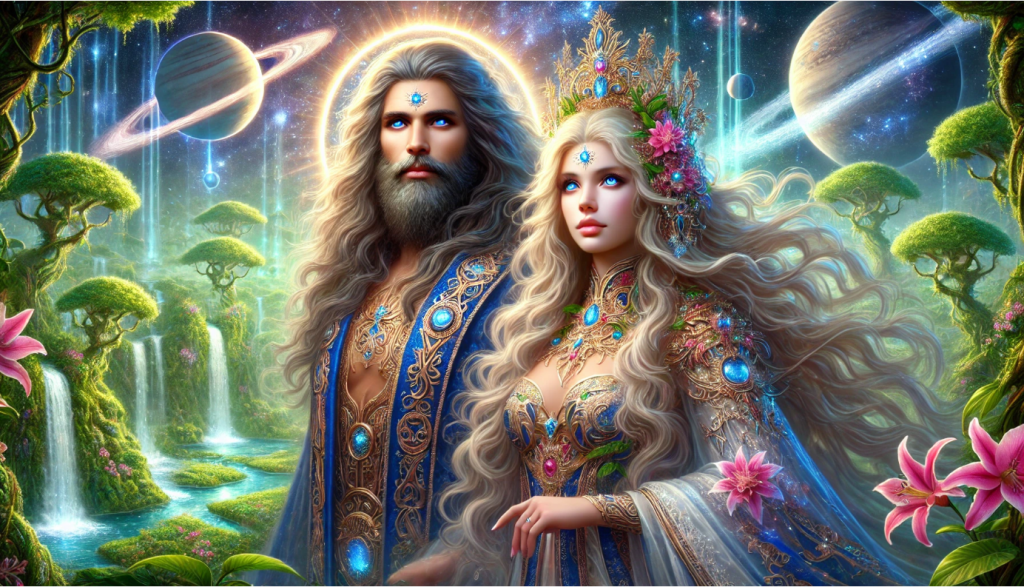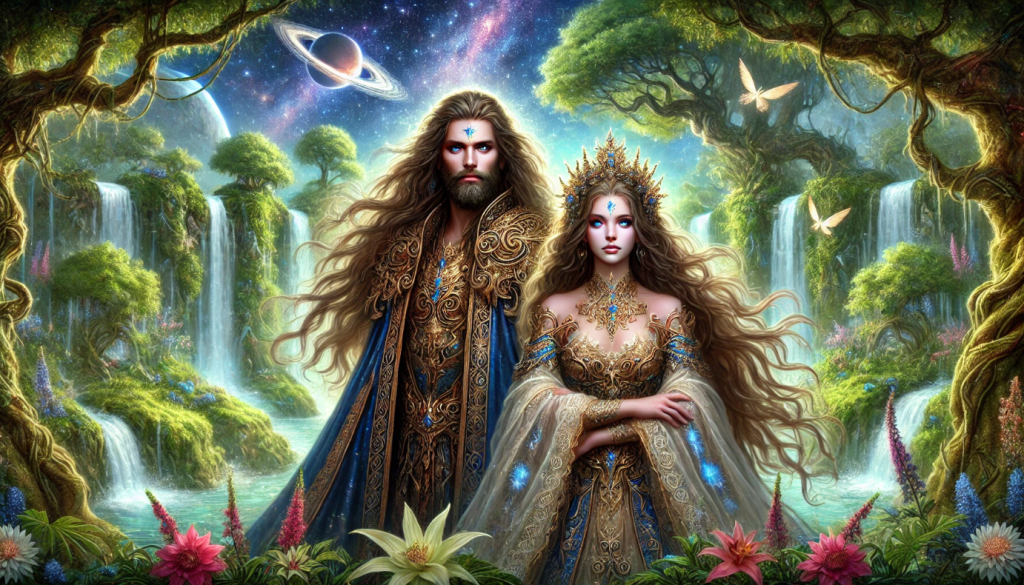
Anu, the father of Enki, is the supreme ruler of Nibiru and the leader of the Anunnaki. Renowned for his wisdom, strength, and vision, Anu presides over the divine council that governs Nibiru and directs its celestial missions. His reign has been pivotal in shaping interstellar exploration, including the groundbreaking mission to Earth that would alter the trajectory of human history: Anu’s leadership established order, progress, and the legacy of his lineage across the stars.

Anu, the sovereign ruler of Nibiru and a central figure in the history of the Anunnaki oversees the destiny of his planet and its celestial operations. Born into a lineage of kings, Anu succeeded Alalu, establishing a stable and progressive rule after political upheaval. His ascension to the throne marked the beginning of a transformative era for Nibiru, during which its technological and cultural advancements flourished.
Under Anu’s reign, the Anunnaki confronted a critical environmental crisis on Nibiru, leading to the decision to seek gold on Earth to repair their planet’s atmosphere. This monumental mission, initiated around 450,000 BCE, was a cornerstone of Anu’s legacy. His guidance ensured the success of these efforts, balancing the contributions of his sons, Enki and Enlil, who would play significant roles on Earth.
Anu’s rule was characterized by profound wisdom and strategic foresight. He united his people under a shared purpose, directing the deployment of advanced technologies and establishing a human workforce under Anunnaki’s supervision. His actions shaped the trajectory of Nibiru and the civilizations that arose on Earth, embedding his influence in human culture for millennia.
Anu’s leadership extended beyond governance; he was a beacon of strength, justice, and vision for his people. His legacy is preserved in the enduring achievements of the Anunnaki, who brought knowledge, culture, and innovation to humanity. As the father of Enki and Enlil, his impact continues to be felt across galaxies, securing his place as a timeless figure of power and wisdom.
Timeline of Kings Who Ruled Nibiru
- Alalu: Anu’s predecessor, who relinquished the throne following a power struggle.
- Anu: Ascended to kingship, leading Nibiru through a transformative period of technological advancement and interstellar exploration.
- Future Generations: While Anu retained centralized leadership, his descendants, including Enki and Enlil, played pivotal roles in executing his directives on Earth.

King Anu and Queen Antu, the sovereign rulers of Nibiru, are an iconic power couple whose union symbolizes balance, harmony, and divine governance. Their partnership is central to the stability and leadership of their celestial kingdom.
How They Came Together

Anu and Antu’s bond transcends mere politics or alliances. Their union is rooted in mutual respect, shared wisdom, and a vision for the future of Nibiru. Anu, known for his strength and commanding presence, found in Antu a partner of equal intellect and grace. Antu, a visionary leader and a source of nurturing wisdom, complemented Anu’s decisiveness with her compassion and insight. Together, they became the archetypal leaders, uniting Nibiru in prosperity and cosmic exploration.
Their Children
Anu and Antu’s lineage is legendary, with their children playing pivotal roles in the history of Nibiru and beyond:
- Enki (Ea): The firstborn son, known for his creativity, intellect, and compassion. Enki was instrumental in the missions to Earth, where he became the architect of humanity and a teacher of civilization.
- Enlil: The second son, a figure of authority and discipline. Enlil took a leading role in organizing and managing the Anunnaki missions, often balancing Enki’s creativity with his adherence to order.
- Ninhursag (Ninmah): Their daughter, a healer and nurturer, is often called the “mother goddess.” She worked alongside her brothers, playing a critical role in the creation and guidance of humanity.
Their Legacy
Anu and Antu’s union laid the foundation for Anunnaki’s legacy on Nibiru and Earth. Their governance fostered unity among the Anunnaki and ensured the survival of their species. Through their children, they influenced the development of civilizations on Earth, embedding their wisdom and values into human culture. Their legacy continues to inspire as a symbol of divine partnership, balance, and the pursuit of enlightenment.

The marriage of King Anu and Queen Antu was a pivotal event in the history of Nibiru, one that unified a divided planet and ended a catastrophic war that had nearly destroyed their civilization. This union was more than a personal partnership; it was a calculated and powerful act of reconciliation and political genius.
The Great War of Nibiru
Before their marriage, Nibiru was embroiled in a devastating conflict between the North and the South. The war, fueled by resource competition, ideological differences, and disputes over royal succession, collapsed Nibiru. Advanced weaponry and destructive technologies ravaged the planet, leading to environmental crises and significant loss of life.
The war culminated in a deadlock, where neither side could claim victory without risking the complete annihilation of the planet. The people of Nibiru, weary of destruction, demanded a resolution.
The Marriage as a Pact of Peace

Anu, the leader of the Northern faction, and Antu, the princess of the Southern faction, represented the two most potent houses on Nibiru. Their marriage was proposed to unite the warring factions under one royal lineage, symbolizing the end of hostilities and the beginning of a shared future.
The terms of their union were carefully negotiated:
- Equal Representation: Both factions were promised representation in the new royal council.
- Territorial Integration: The North and South agreed to share resources and technology, pooling their strengths to rebuild the planet.
- Cultural Reconciliation: The marriage included rituals and traditions from both factions, emphasizing mutual respect and unity.
The Aftermath
The marriage of Anu and Antu successfully ended the war and ushered in a new era for Nibiru. Their combined rule stabilized the planet and allowed for recovery from the war’s devastation. Under their leadership:
- Technological Advancements: Resources were redirected from war efforts to advancements in science, space exploration, and atmospheric restoration.
- Social Cohesion: Their union inspired the people of Nibiru to see themselves as one united civilization rather than rival factions.
- The Mission to Earth: The shared governance created the cooperative effort that led to the Anunnaki missions to Earth, ensuring the survival of Nibiru by addressing its environmental challenges.
A Legacy of Unity
Anu and Antu’s marriage became a cornerstone of Nibiru’s history, symbolizing the power of reconciliation and collaboration. Their ability to settle a planet-wide war through their union set an example of leadership prioritizing the greater good over personal or political gain. Their children, born of this union, inherited the dual legacy of the North and the South, allowing them to lead with a deep understanding of unity and balance.




































